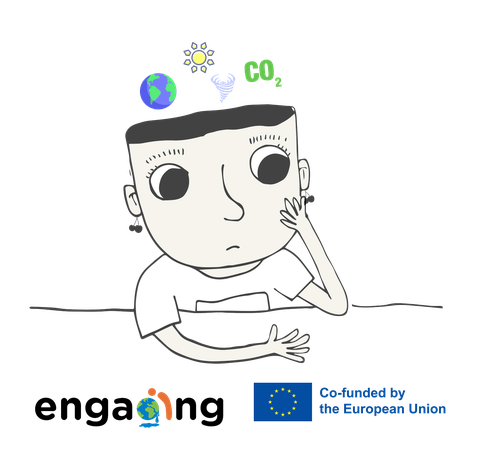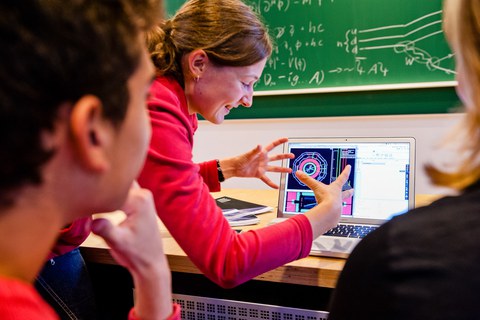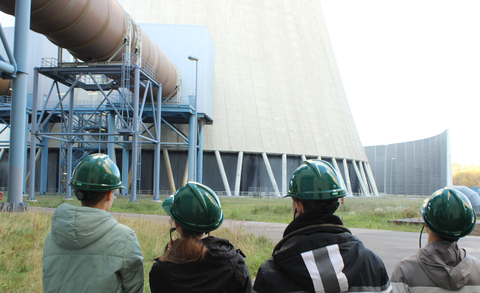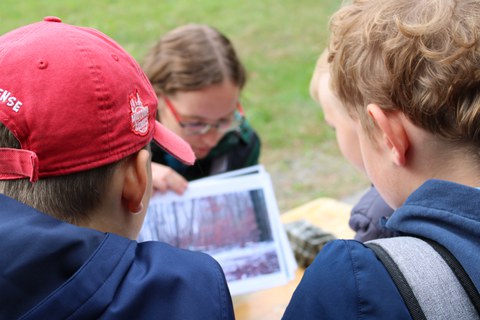Research projects
Current Projects
The EU project "tEachiNG criticAl thinkinG on clImate chaNGe" (ENGAGING) aims to evaluate and strengthen the critical thinking skills of university and high school students in the context of climate change.
Critical thinking is one of the basic requirements for participation in democratic life and by linking it to the physics topic “climate change” in our project, important content knowledge and social competences of the students will be trained. Prospective and active teachers, who are multipliers, will be provided with the necessary tools to promote this knowledge and competences as they reach many students. For this reason, the project will design workshops, summer schools and in-service trainings to support future teachers and those already active in schools. Developed teaching materials will be made available on www.engagingforclimate.eu.
Project partners of the European Union funded project "ENGAGING" are the TU Dresden, the University of Innsbruck, the Ruhr-University Bochum and the KU Leuven.
Netzwerk Teilchenwelt ("World of particles network") is a network of 26 particle and astroparticle physics research institutes at 24 locations throughout Germany, as well as CERN, which teaches current astroparticle/particle physics to young people and teachers. In project days, training courses and workshops at CERN, several thousand participants per year experience research at first hand at the largest experiment in the world - the Large Hadron Collider at CERN. They gain an insight into the working world of scientists and can act as researchers themselves for a day. The aim of Netzwerk Teilchenwelt is to make current science in astroparticle/particle physics accessible to young people and teachers at schools, student laboratories, student research centers, museums, etc. via mobile offers. In cooperation with the Joachim Herz Foundation, numerous teaching materials on particle physics have also been produced.
Netzwerk Teilchenwelt is funded by the Federal Ministry of Education and Research and the Joachim Herz Foundation; its patron is the German Physical Society.
Further information on the Particle World Network and its services can be found at www.teilchenwelt.de.
Active members of the project: Prof. Dr. G. Pospiech, P. Lindenau, K. Gedigk
Project management at the TU Dresden at the Institute for Nuclear and Particle Physics
STEAM-CT is an EU-funded collaborative project promoting critical thinking (CT) in the STEAM disciplines, i.e. science, technology, engineering, arts, and mathematics.
Cooperation partners are
- Global Hands-On Universe (Sao Domingos de Rana, Portugal)
- Pädagogische Hochschule Tirol (Innsbruck, Austria)
- Science View (Nea Ionia, Greece)
The project will run from October 2025 to September 2028. Dr Farahnaz Sadidi is the project manager and Dr Thomas Prestel is a member of the project team.
The project aims to enable teachers to develop and implement integrated STEAM-CT teaching units in their lessons. To this end, targeted training courses are being developed for teachers and teacher training students to enable them to embed tasks that promote critical thinking directly into their regular lessons. At the same time, teacher training at university level is being strengthened as these structured courses are being integrated into existing programs and assessment tools are being provided to evaluate competence development.
All materials developed in the course of the project, including handouts designed to promote critical thinking among teaching staff and best practice examples of tasks, will be made available on an e-learning platform as an open educational resource (OER). The relevant link will be available in the near future.
Expired Projects
Quantum technologies are already a well-established and rapidly growing field of scientific research with great application potential for industry. One of the current challenges for Germany and Europe is to meet the expected growing demand for specifically trained specialists in the medium and long term.
From a long-term perspective, the project QUILT aims to raise awareness of this topic and interest in it as a professional field through a career-oriented approach in schools. Teachers should be able to give young people an authentic insight into the professional world of quantum technologies and at the same time convincingly convey the associated fascination.
Further information can be found at the project website.
Active members of the project: Prof. Dr. G. Pospiech, M. Förster
Former members: Julia Unger, Markus Standfuß (Student Assistant)
The interdisciplinary project "Out-of-school learning locations in the learning landscape Saxony" of the subject didactics of chemistry, German, geography and physics pursues the goal of sustainably anchoring extracurricular learning in teacher training and further education.
To achieve this, seminars for student teachers and training courses for teachers are designed and carried out. The basis for these courses is a heuristic for opening up extracurricular places of learning. Good practice examples developed in the project for learning at extracurricular learning locations provide the practice-oriented framework for the seminars.
In order to make it easier for teachers to find extracurricular places of learning and to search for selected categories, a digital map of extracurricular places of learning in Saxony is being created as part of the project. Stakeholders of the learning locations have the opportunity to present their teaching and learning offers in a targeted manner via a database-supported input mask. The project aims to integrate extracurricular learning into everyday school life in a sustainable way.
Further information can be found at TUD-SyLber project "Extracurricular learning locations in the learning landscape of Saxony".
Active members of the project: Prof. Dr. G. Pospiech, P. Böning
In this interdisciplinary project, special modules were developed to enable students to design attractive learning processes in cooperation with extracurricular learning locations. In addition, joint subject-linking theoretical approaches were developed with the long-term goal of a (subject) didactic theory for the integration of extracurricular learning locations into school-based teaching and learning processes.
The Chair of Didactics of Physics, the Chair of Modern and Contemporary History and Didactics of History, the Chair of Contemporary German Literature and Didactics of German as well as the The Chair of vocational education / didactics of chemistry were involved in the project.
Further information at TUD-SyLber-Project "Learning Landscape Saxony - Making learning attractive through extracurricular learning locations"
Staff involved in the project: Prof. Dr. G. Pospiech, W. Kuske-Janßen
- QUER
Qualification programme for academics entering the teaching profession (joint project with educational sciences; M. Lipinsky, A. Heine) (1st April 2012 till 31st December 2014) - NaKuP
natural sciences meet art (joint project with chair of didactics of chemistry and SKD; T. Prestel; G. Seidel) (1st March 2011 till 28th February 2014) - SECURE
Science Education Curriculum Research (M. Willeke), EU-Project, (1st October 2010 till 31st October 2013) - LSU
teacher study corporations, (joint project with chair of didactics of chemistry and IFW; S. Lein) (1st March 2010 till 28th February 2013) - FINA
woman in science and engineering (joint project with chair of didactics of chemistry) ( till 31st December 2009)





